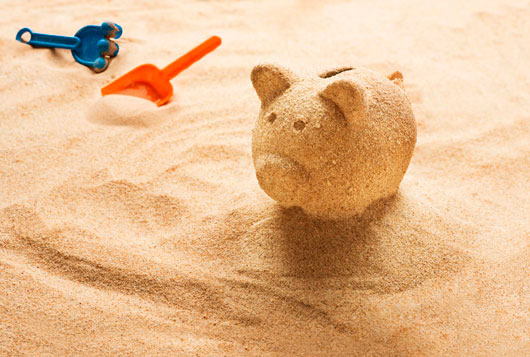
Although the official start of summer is days away, it’s never too late to start saving for that family vacation. The most recent statistics from the Bureau of Labor Statistics say that the average American family spends $1,415 on a family vacation. Those numbers include transportation, lodging, food and beverage, entertainment, and gifts. Of course, your costs may be more or less depending on the size of your family, how far away you choose to go, how you choose to get there, where you choose to stay, and how much you spend on entertainment when you’re there.
Wherever you choose to go, you’ll have to have at least a few dollars on hand. Not sure where to get the cash from? Here are a few ideas to save some money:
1. WONDER OUT LOUD
Talk to your family about what they’d like to do this summer and what your family can do to make it happen. Once everyone is on the same page about saving, it will be easier and more fun to reach your savings goal—together. It might even help to create a dreamboard as a family or hang some visual representation of where you’d like to go or how far along you are towards your savings goal.
2. PARTY HARD
It’s warm, the kids are out of school, and you’re getting lots of invitations to events. It sounds fun until you realize that the gas money to get there and back, plus the cost of the actual event, tax, and food is all dollars that could be going into your vacation fund. Instead, why not invite friends over to hang out? Everyone can bring a dish, which saves on food costs, while socializing and helping you reach your vacation goal.
Read Related: 5 Great Family Road Trips to Take This Summer
3. FIND THE BURIED TREASURE
Have you ever gotten home, taken your keys out of your pocket, and found tons of change in your pocket? DesignItGirl blogger Nicole Torres has. She uses water bottles to store her change, “I have one of those large empty Water Bottles and every week I put $20- $40 dollars in coins. Since we don’t see coins as we do the actual dollar we tend to ignore its there.” Families can save about $50 per month from keeping their spare change. That’s $600 a year with no real effort. Not bad. If you’re concerned about rolling all that change, don’t worry. There are several different ways to turn that jingle into paper that folds. One of my favorites are the Coinstar machines available in most grocery stores. You just drop in your change, the machine takes a percentage, and you get a receipt with the amount of cash you brought in, and the checkout cashier gives you the cash.
4. SPARE MONEY
Want to have access to more money without giving up anything you’ll miss? Cancel memberships that you’re not actively using. Take a look at those credit union statements. Are you signed up for the gym, but you never go? Do you have a video service charging your card every month, but you never order videos? Have you signed up for monthly credit monitoring that you didn’t want and forgot to cancel to get your free credit report? Canceling things that cost you money and you see no value from are great ways to put a few more dollars towards your vacation fund.
5. BRAWN AND BRAIN
Have you ever called a repair person to your home at $85 an hour only to have the person take 10 minutes (but charge you the full $85 fee, of course) to change your air filter in the air conditioning unit or tighten the dryer tube or something else that you realized you could have done yourself for free? The next time something breaks save a few dollars by trying to repair it yourself. There are lots on do-it-yourself websites, blogs, and videos to help you with the process. Of course, there are some jobs that are better left to professionals, but I’d be willing to wager that you can fix tons of things on your own. If it’s something you don’t think you can tackle, ask a handy neighbor. Offer to do something you’re good at in exchange.
6. USE YOUR RESOURCES
Find free resources in your community to keep you entertained while saving a few dollars. Libraries are a great example of a free, community resource that provides free book rental, free movie rental, free Internet usage, and many other things. Check around to see what paid services can be replaced with no-cost or low-cost services.
7. ELIMINATE WASTE
How much money do you spend buying cigarettes, alcohol, caffeine and sugar? You’ll save money by not purchasing those items and you’ll save a few dollars on your health insurance and life insurance. Think of how much money you’ll save if you stop buying coffee in the drive-through, drinks at happy hour, and donuts on the way to meetings.
8. HAGGLE
If you don’t ask, you don’t get. Before paying for products and services, be sure to search for the best deal possible. Use Google searches or phone apps to compare prices in your area and online. Then, before paying ask the seller if this is the best deal you can get. You might be surprised at how much money you can save if you just ask.
9. SET UP AN AUTOMATIC DEPOSIT
Another great way to save is to set up an automatic deposit from your checking account to a special interest-bearing account like a money market account. Have your credit union or bank electronically send whatever amount you designate from your checking account weekly or bi-weekly to your interest-bearing account for free. Putting away even $50 per pay period will net you $1,200 over the year.
10. ONLY THE MINIMUM
Now that you’ve got some money, you need to make sure that it’s working for you. A checking account is a place to store money not to have it work for you. Make sure to put “spare” money in an account that’s going to give you as much interest as possible. A great place to seek out these kinds of accounts is Bankrate.com. You can check interest rates on savings accounts, certificates of deposit, money market accounts, and other ways to have your money work for you. Leave only the minimum amount of money that you need to run your household in your checking account.
11. AVOID FEES
Find out what fees your credit union or bank charge, and how they assess them, and then make plans to avoid paying them. It could be as easy as setting up electronic deposit of your paycheck to avoid a monthly fee, downloading an app to locate the closest credit union branch to avoid ATM fees, or linking your checking account to your savings account to avoid overdraft fees.
12. WIN IN THE MARGINS
Another great way to find money for a summer vacation is to find ways to trim the money that you’re currently spending. Helen Troncoso suggests,”Making your own coffee and bringing your own lunch. I did that and was surprised at how much I saved. Plus making your own lunch is healthier,” Most websites say that making your own lunch can save you between $1 and $5 every day. Even going with the low estimate you’d save $20 a month and that comes to $240 a year.
That sounds pretty good, but $20 a month may not get you to your summer vacation. Rita Nisa says, “Stop eating out so much. I did that for a month and I saved money! You don’t have to cut it out completely, but instead of eating out every week, eat out once or twice a month.” According to online consumer-spending guide Bundle, the average American family spends $232 a month eating out.
Of course everyone’s situation is different, but with these suggestions you can get everyone together for some family fun this summer. What strategies do you use to save money?










